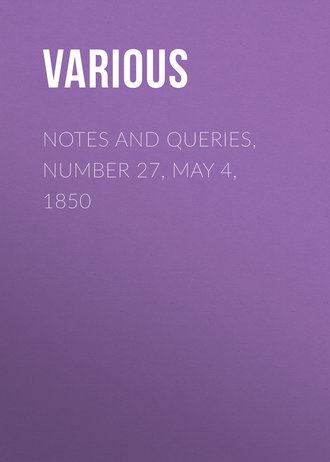 полная версия
полная версияNotes and Queries, Number 27, May 4, 1850
1
It occurs many times in the Moeso-Gothic version of the Gospels for [Greek: ptochos]. From the Glossaries, it appears that iungalauths is used three times for [Greek: neaniskos], a young man; therefore lauths or lauds would signify simply man; and the plural, laudeis, would be people. See this established by the analogy of vairths, or O.H.G. virahi, also signifying people. Grimm's Deutsche Gram. iii. 472., note. "Es konnte zwar unlêds (pauper) aber auch unlêths heissen."—D. Gr. 225.
2
Sir F. Palgrave has given this extract in the Appendix to his Rise and Progress of the English Commonwealth, p. ccccvii., where, by an error of the press, or of transcription, the word stands lich. It may be as well to remark, that the corresponding word in Latin formulas of the same kind is "catallis," i.e. chattels. A passage in Havelok, v. 2515., will clearly demonstrate that lith was at least one kind of chattel, and equivalent to fe (fee).
"Thanne he was ded that SathanasSket was seysed al that his was,In the King's hand il del,Lond and lith, and other catel,And the King ful sone it yafUbbe in the hond with a fayr staf,And seyde, 'Her ich sayse theIn al the lond in al the fe.'"3
The author of Tripartita seu de Analogia Linguacum, under the words "Leute" and "Barn," says:—"Respice Ebr. Id. Ebr. ledah, partus, proles est. Ebr. lad, led, gigno." A remarkable coincidence at least with Grimm's derivation of léôd from the Goth. liudan, crescere.
4
Thus, Anthon, Teutschen Landwirthschaft, Th. i. p. 61.:—"Das Land eines jeden Dorfes, einer jeden Germarkung war wirklich getheilt und, wie es sehr wahrscheinlich, alsdan verlost worden. Daher nannte man dasjenige, was zu einem Grunstüke an Äkern, Wiesen gehörte, ein Los (Sors). Das Burgundische Gesetz redet ausfdrücklich vom Lande das man in Lose erhalten hat (Terra sortis titulo acquisita, Tit. i. § 1.)" Schmeller, in his Bayrishces Wort. B. v. Lud-aigen, also points to the connection of Lud with hluz-hlut, sors, portio; but he rather inclines to derive it from the Low-Latin, ALLODIUM. It appears to me that the converse of this is most likely to have been the case, and that this very word LEDS or LÆDS is likely to furnish a more satisfactory etymology of ALLODIUM than has hitherto been offered.









